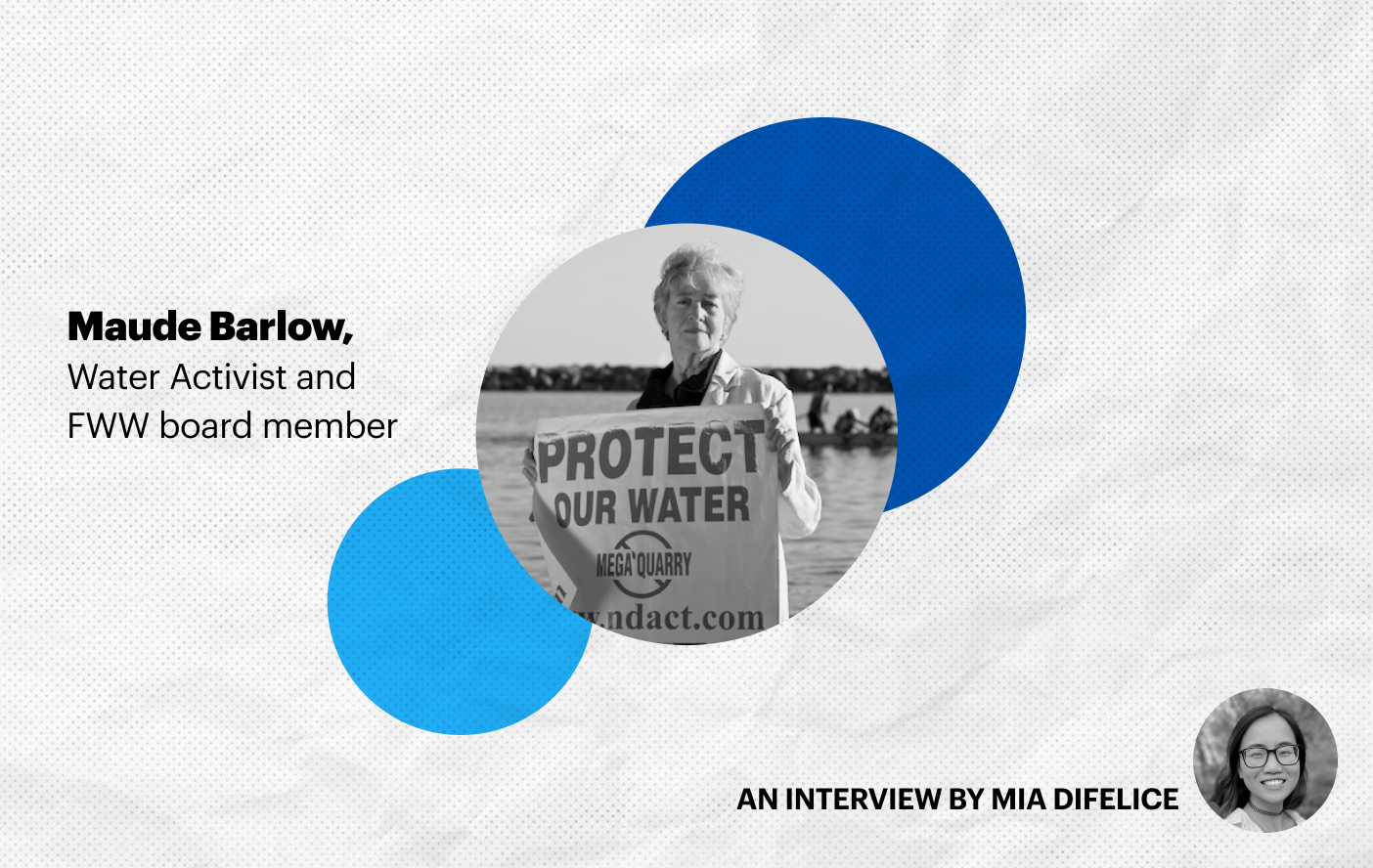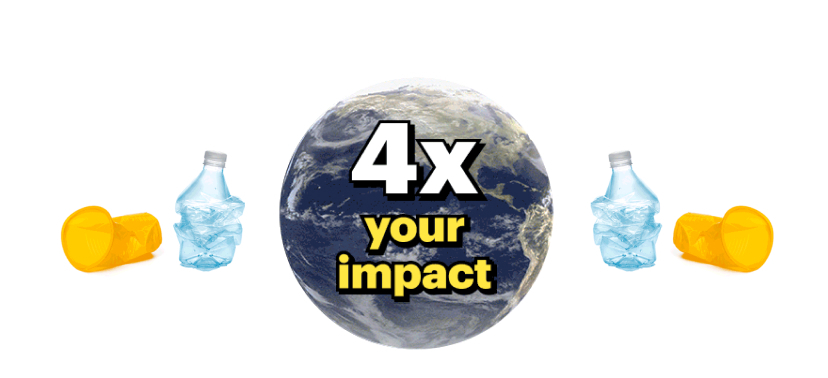This week marks the 12th anniversary of the United Nations’ recognition of the human rights to water and sanitation. To commemorate the anniversary, Digital Copywriter Mia DiFelice sat down with Maude Barlow, FWW board member and long-time international water rights activist. In this interview, Maude talks about her experiences fighting for the right to water, the current challenges we face and her hopes for the future. The interview has been edited for clarity and length.

The Journey To The United Nations
How did you come into the water movement?
I came out of the women’s movement here in Canada, and I came into water absolutely by accident. Back in 1985, Canada negotiated a free trade agreement with the U.S. I was concerned about its effects on social security for women. All these goods would be subject to new rules of trade that basically said, “Government is hands-off, the corporations get to decide.” But when I read the annex at the back of this agreement, it listed all of the goods under the new rules, like running shoes, cars and so on — and there was water in all its forms.
I remember thinking, I don’t understand this at all, how is water a tradable good? Water is a public trust! And that’s what set me on a journey. I realized that there were corporate interests that recognized before most of us that the planet was running out of clean, accessible water. They saw we were taking it for granted, we weren’t treating it well. They saw that anyone who controlled it was going to be both powerful and potentially wealthy.
In the run up to the UN’s recognition, you were the Special Advisor on Water to the President of the UN General Assembly. What were the high and low points of that experience?
In 2008, Father Miguel d’Escoto Brockmann took over as president of the UN General Assembly. He called me and said, “Come work with me, we’re going to do this together. We’re going to make water and sanitation a human right.” We put our heads together with other activists and put the question to the General Assembly on July 28, 2010. I honestly didn’t think we were going to make it. My country [Canada] was leading the fight against the human right to water. The U.S. was opposed, Great Britain was opposed. The World Bank was opposed, all the big water companies were opposed, etc.
But during the campaign, we brought people in to tell their stories to the United Nations. When Pablo Sonam, the ambassador to Bolivia, stood before the General Assembly on July 28, 2010, he had a report in his hand from the World Health Organization. He read from the report, which said that every three and a half seconds, somewhere in the Global South, a child dies of waterborne disease. And he held up one finger. And then another. And another, and then just half a finger — and you could have heard a pin drop in the General Assembly of the United Nations. It was so powerful.
The Importance Of The Right To Water
How has the UN’s recognition of the human right to water changed the playing field for activists, especially here in North America?
The right to water matters, even though some people say, “Well, everything didn’t change the next day.” Because rights turn it into an issue of justice, not charity.
Since 2010, over four dozen countries have either amended their constitution, or introduced new legislation to guarantee the human right to water. Once it’s in the constitution of a nation state, it becomes the right of the citizens of that state, and those citizens can use it in legal cases. I’d like to see it more widely understood and widely used. But it was a really important beginning. And I consider it an evolutionary step forward for humanity.
In Canada, we launched this Blue Communities project where municipalities pledge to protect water as a human right, to not allow privatization and to start phasing out plastic bottled water on municipal premises. That’s been tremendously exciting. It’s now hit 337 municipalities around the world, including big ones like Berlin and Paris.
Los Angeles became a blue community a couple of years ago. And you might think, Well, Los Angeles is so wealthy, why would they need to do this? But in the Greater Los Angeles area, there are a million people without proper access to water and sanitation. So people who think this is just an issue in the Global South are wrong. I want to disabuse us of this notion that it’s only in some poor countries, although, of course, the crisis is much more stark in some places than others.
The Fight Ahead For The Right To Water
What do you see as the next steps and challenges in the fight?
I worry about the financialization of water, which is something Food & Water Watch is leading the fight against with legislation and with public outcry. I worry about the commodification of water in different ways. For example, in the Western United States, water markets are opening up and farmers can sell their excess water, like a cash crop.
We are facing what I call “the perfect storm” of declining water sources, either polluted or decimated. We’re pulling water faster than it can be replenished by nature. The demand for water on our planet is going straight up and the supply is going straight down. It is absolutely startling. There’s also growing inequality within and between countries. And then there’s the rising cost of water, particularly when it’s privatized.
Protecting and restoring watersheds, forest soils and wetlands is absolutely crucial. Yet we continue to take those forests and wetlands down as we build more stuff and we trade more stuff. We have this notion of unlimited growth. But we don’t yet understand how sacred water is and that water is life and that we’re part of water, we’re part of nature, we’re not separate from it.
What has helped you persist in what looks and feels like a very uphill battle?
The wonderful people in our movement, including Food & Water Watch and the leadership of Wenonah Hauter and others, gives me tremendous hope. And meeting young people from around the world who care and are doing something.
I’ve just finished a new book called Still Hopeful: Lessons from a Lifetime of Activism. In the book, I share that you never know where the wind is going to come from. As Rebecca Solnit wrote, “History is not an army. It is a crab scuttling sideways.”
We can’t control the outcomes. But my definition of hope is a commitment to protecting all that is good for future generations and the planet, knowing that you can’t control the outcome. But you have faith that what you do matters. So you put your hand out and you touch the web of the universe, wherever you are. You can’t control everything else, and you’re not sure what others are doing. But you have to have faith that others are doing something. And that together, you’re moving forward.
That’s the definition of what American spiritual leader Joan Halifax calls “wise hope.” I love the concept of wise hope. It’s not, “Everything’s fine. Don’t worry, be happy.” No. Having wise hope means knowing we have serious problems. But we look them in the eye, and we deal with them.
What You Can Do: Volunteer To Turn Your Community Blue!
Hearing from Maude makes it clear how important it is for everyone to act locally to protect their resources. Communities around the world have passed local resolutions pledging to promote the human right to water and sanitation. These blue communities reject water privatization and promise to keep water in the public service. They also say “no” to bottled water in public buildings and events. With every blue community, we come closer to realizing our human right to clean, affordable water.
Learn how to advocate for your community to turn blue!

Time to face it —~it’s people or plastics.~We can’t have both.
Become a plastic pollution fighter this Earth~ Day and have your gift MATCHED $3-to-$1!


